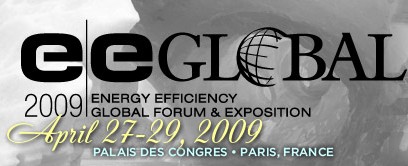I have a couple of overview-type posts in mind re: the Energy Efficiency Global Forum, but first a couple more Tidbit Posts, sharing factoids and insights that otherwise won’t find a home. Here’s the second of three, drawn from the “executive dialogs” that took place alongside the main plenary sessions.
• Lena Ek, member of EU Parliament from Sweden, pointed out a rather startling fact about the success of the EU’s appliance labeling program, which assigns appliances letter grades from A-G based on their efficiency: after 15 years, 98% of refrigerators and washing machines sold in Europe are grade A. Consumer information alone can drive markets, even absent regulations.
• U.S. Rep. Michael C. Burgess (R-Texas) wanted to make it very clear that he believes in climate change. He’s just not sure humans are causing it. Upon saying this, Burgess was heckled from the crowd. “You don’t believe in science!?” shouted several times. And this was not the heckling kind of crowd. You just can’t get away with that kind of BS overseas — they don’t feel the need to pretend like it’s a respectable position.
• Niels B. Christiansen, President & CEO of Danfoss, pointed out that adding a district heating system to a power plant can raise its efficiency from 60% to over 90% — and the EU counts that as renewable energy under the ETS.
• John Fielder, president of Southern California Edison, pointed out that California’s plan is very specific about its utilities’ “loading order”: energy efficiency and demand response, renewable energy, distributed generation, and fossil fuels. Sounds about right.
• Fielder also noted that getting to 10% electric vehicles in his service area would reduce more GHGs than going from 20 to 33% renewables per California’s target. (For regions that already have high renewable penetration, transportation is the big efficiency get.)
• Peter Rathje from Denmark gave a fascinating talk about Project Zero, the effort to turn Sonderborg into a zero-carbon city by 2029, while generating jobs and sustainable growth. Check out the website for the (amazingly comprehensive) details. Nice to see some ambition!
• Dr. Richard Bradley, head of the Energy Efficiency and Environment Division of the International Energy Agency, pointed out that efficiency has delivered — according to IEA data starting in 1973 and running through the present, the world is using 58% less energy than it would have if efficiency improvements hadn’t been made. Nonetheless, efficiency persistently fails to provide the truly large-scale payoffs that studies have been saying are possible ever since the ’70s.
• Bradley: one big and underappreciated problem is compliance. Studies show that enforcement efforts tend to be feeble and anemically funded and that non-compliance rates on efficiency mandates run about 50%.
• Bradley: since the ’70s, government research money has gone overwhelmingly to nuclear power, with everything else (including efficiency) getting peanuts. That needs to change.
• Jackalyne Pfannenstiel, former chair of the California Energy Commission, said something in passing that jumped out at me. I didn’t entirely catch the context, but I’m fairly sure she said: efficiency results via utility-run programs are ten times more expensive than efficiency results achieved via standards. If that’s so, I’d sure like to know why and hear more about it.
• David Rodgers from the DOE’s Office of Energy Efficiency and Renewable Energy (EERE) showed a chart of projected energy demand: in terms of demand destruction, the economic downturn and investments from Obama’s stimulus bill are projected to have roughly the same effect. Whether that shows the remarkable power of the bill (as Rogers said) or the remarkable impact of the downturn is in the eye of the beholder, I guess.
• Rogers’ list of reasons people don’t take advantage of available efficiencies:
- Economic reasons: high upfront costs, misaligned incentives, lack of aggregation (lots and lots of scattered, small gains), and inconsistent lifecycle costing.
- Policy reasons: policies are inconsistent across time and regions, utility regulations are woefully out of date, and most contracting is built around short payback times.
- Informational reasons: a general lack of information available to consumers and a general lack of awareness that it matters.
• Peter Smith, an environmental strategist for 1E, pointed out that IT accounts for between 2-4% of global energy demand — equal to aviation — and that PCs represent 40% of IT demand. So managing PC power consumption is quite a big deal, but it’s done poorly, because IT managers don’t get any of the rewards for saving power. (Smith stumped for a product he was involved in called Night Watchman which allegedly saves Dell $1.8 million a year — a 40% reduction in the company’s energy costs.)




